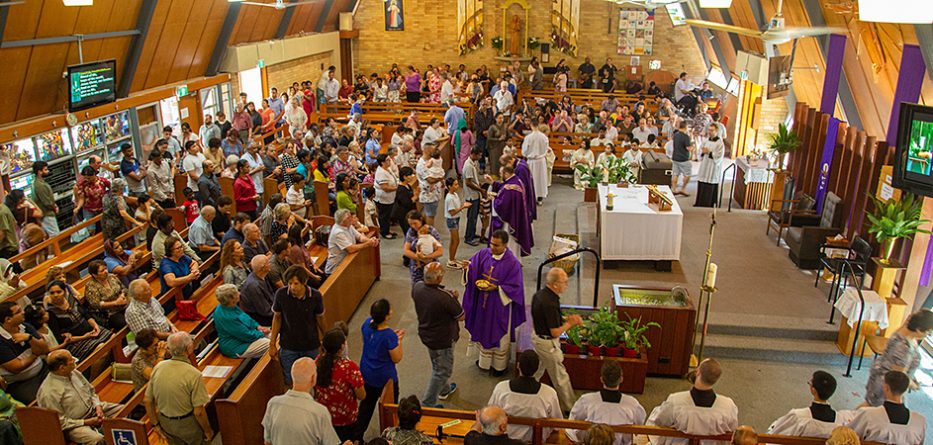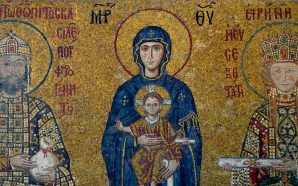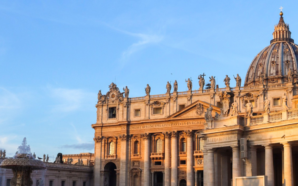Plenary Council Participation and Reception: Synodality and Discerning the Sensus Fidelium
By Reverend Associate Professor Ormond Rush
The theological meaning of our forthcoming Plenary Council can only be appreciated fully when we locate it within the comprehensive vision of Vatican II regarding revelation and faith, its transmission through history, and, consequently, the nature and mission of the church. It is this conciliar vision which is clearly grounding Pope Francis’ calls for “a listening church, a synodal church,” at all levels of church life [1]. The Holy Spirit, he says, must be given breathing room to bring forth such a church. The Spirit’s instrument for interpreting divine revelation is the sensus fidei, a “sense of the faith”, or better, a sense for the faith. It is capacity which the Spirit gives, along with the gift of faith, to a every baptised believer and to the church as a whole. A synodal church is a church that listens to the Spirit communicating through the sense of all the faithful, the sensus fidelium. The Plenary Council, in its preparatory stage and in its celebration, will be a concentrated moment in the life of the Australian church of listening to the Holy Spirit, by listening to the sensus fidelium.
Vatican II’s document Dei Verbum speaks of “the treasure of divine revelation entrusted to the church” (DV 26). Understanding the council’s (and Pope Francis’) dynamic understanding of that revelation (as a personal dialogic encounter between God and human beings throughout history), and its related dynamic understanding of how the church should constantly engage with the God entering into dialogue with us, will be fundamental for understanding what we are doing and why we are doing it, in our preparation, celebration and implementation of the Plenary Council. We will be trying to listen to God, by listening to one another. And at the end of it all, when the Plenary Council communicates its decisions, the participants hopefully will be able to genuinely say, as the participants at the so-called Council of Jerusalem put it when they announced their decisions: “it has seemed good to the Holy Spirit and to us” (Acts 15:28).
Back to Dei Verbum, Vatican II’s Dogmatic Constitution about divine revelation and the way it is transmitted by the church throughout history. One of the central desires of this document is to move away from a one-dimensional understanding of divine revelation that the church had slipped into in the second millennium, seeing “revelation” simply as a body of doctrines and moral teachings which has been communicated directly from God, and seeing “tradition“ simply as a collection of such teachings and practices. Of course such doctrines, moral teachings and ecclesial practices are highly important; they are benchmark formulations which must guide us; the church has had to formulate them at various times in its history oftentimes in the face of dodgy alternatives, and has had to state as clearly as it could, in the language of the day, the implications (regarding this or that issue) of what God had revealed in Jesus Christ through the Holy Spirit, as encountered and interpreted at that time and place. According to Vatican II’s richer understanding, the church’s mission is to “tradition”—in word, sacrament, and deed—this ongoing divine encounter and its ongoing interpretation. Within that process of what Vatican II calls “the living tradition” (DV 12), important but time-conditioned doctrinal formulations of the church to various issues are intended to serve, to facilitate, what is the primary reality of divine revelation—that is, God’s loving outreach to humanity in Christ through the Spirit, dialoguing with humanity in forever new contexts throughout history.
Dei Verbum calls this dynamic interaction between God and humanity the living Word of God; scripture, as the normative witness to this reality, the council calls “the written word of God”. But scripture is not revelation itself; God’s self-revelation—captured in the dynamic phrase “the word of God”—is God addressing us as friends and inviting us into his company, as Dei Verbum 2 puts it, not just back then, in those foundational times in the early church, but also now, in the complex world of 2017. Just last week (11 October 2017), Pope Francis, in commemorating the 25th anniversary of the promulgation of the Catechism as a collection of the doctrines of the church, summarises all these points of Dei Verbum: “Tradition is a living reality and only a partial vision regards the “deposit of faith” as something static. The word of God cannot be moth-balled like some old blanket in an attempt to keep insects at bay! No. The word of God is a dynamic and living reality that develops and grows because it is aimed at a fulfilment that none can halt.” [2]
In other words, divine revelation didn’t just happen 2000 years or so ago, when Jesus went about his ministry, was killed, rose from the dead, appeared and sent the Holy Spirit. Revelation is a reality here and now. That doesn’t mean there can be some new revelation, beyond what the Scriptures has witnessed to, and tradition asserts. But, the same God, in the same Jesus Christ, through the enlightenment and empowerment of the same Holy Spirit, is forever engaging with human beings in the ever-new here and now of history that relentlessly moves humanity into new perceptions, new questions and new insights, in diverse cultures and places, especially in his church, as it courses through history into unknown territory. Vatican II, accordingly, urged the church to be attentive to the movements of God present in the flow of history, by attending to “the signs of the times” (Gaudium et Spes, 4 and 11). Discernment of the signs of the times seeks to determine what God is urging on us to see in new times; but also urging us to be attentive to the traps—where we could be being drawn into ways of thinking that are not “of God”. We’re getting close here to what we will be on about in our Plenary Council. What are the signs of the times in 2017 (which may well appear somewhat different by 2020!) that reveal God’s will for humanity, for us in Australia, and where do we need to be wary, lest we be sucked into false alternatives?
Part two will be published tomorrow.
Fr Ormond Rush is a priest of the Diocese of Townsville, and lectures in theology at the Brisbane campus of Australian Catholic University (ACU).
This paper originally appeared in Edition 27 of the Plenary Post from the Plenary Council 2020. Reproduced with permission.
[1] Address at the Ceremony Commemorating the 50th Anniversary of the Institution of the Synod of Bishops, 17 October 2015, (hereafter cited in footnotes as “17 October 2015 Address”), http://w2.vatican.va/content/francesco/en/speeches/2015/october/documents/papa-francesco_20151017_50-anniversario-sinodo.html.
[2] 11 October 2017, see http://www.archivioradiovaticana.va/storico/2017/10/11/pope_francis_the_dynamic_word_of_god_cannot_be_moth-balled/en-1342352








